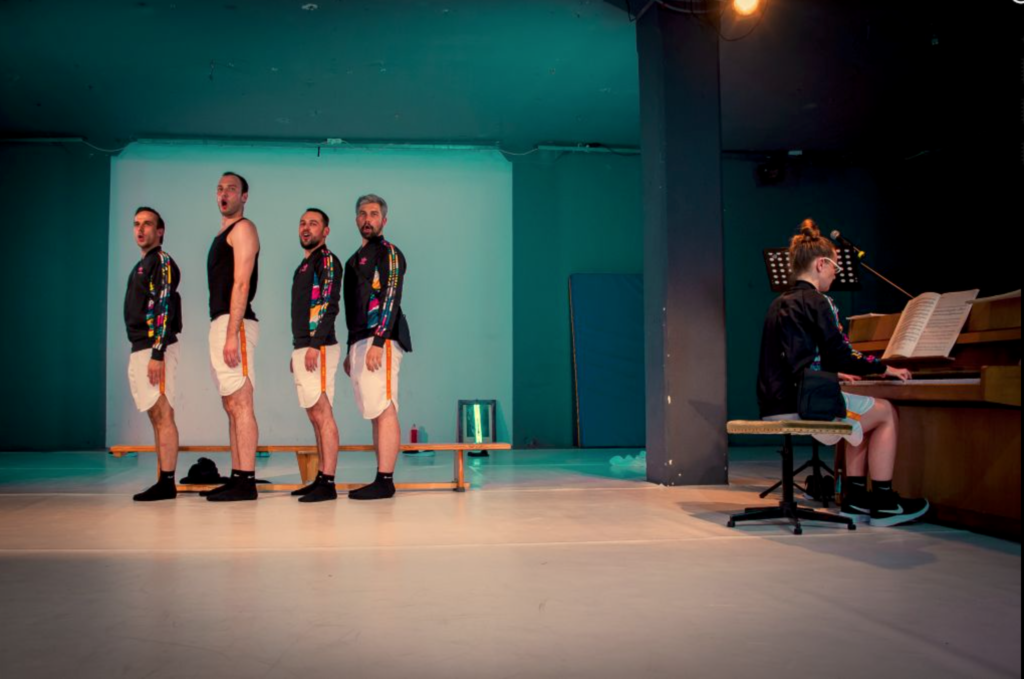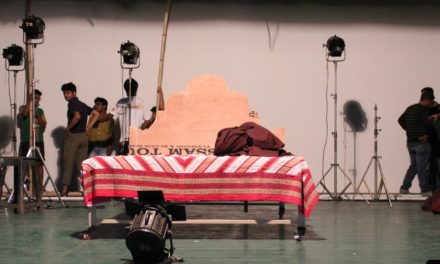Cezary Goes To War [Cezary Idzie Na Wojnę], an autobiographical piece directed by Cezary Tomaszewski, is a musically charged queer fantasia that directly and cheerfully attacks and deconstructs the military rhetoric and nationalistic ethos in Poland. As part of the Komuna//Warszawa (a critically acclaimed experimental theatre company based in Warsaw) series Before the War/War/After The War, Tomaszewski devises this dance-music-performance piece based on his personal experience with the army conscription committee, during which he was categorized based on the military standard of masculinity. He draws on the absurd official language of the definitions of each category (usually a long list of diseases or physiological problems), enhancing their nationalistic power with patriotic songs from the father of Polish national opera Stanisław Moniuszko’s Home Song, then destroying them through his ingenious juxtaposition of choreography and the disruptive force of queering performativity.

Cezary Goes To War, directed by Cezary Tomaszewski, Divine Comedy 2017, Juliusz Słowacki Theatre in Kraków. Credit: matereały teatru
Tomaszewski has a strong classic musical background, with 15 years of singing experience at the Polish National Opera (Teatr Wielki), and is known for his experiments with classical pieces. He puts classical music into a variety of contexts and places, aiming to disrupt and problematize its conventionality and rigid classical connotations. He has set Monteverdi in a milk bar, Gluck in a sports hall, and Moniuszko in a parlor in Kraków. In Cezary Goes To War, he again exposes the vulnerability of those conventional and patriarchal norms of music. He uses the war symphonies of Dmitri Shostakovich (a Russian composer whose music, ironically, was banned by Stalin because it was considered a challenge to Soviet realism and patriarchy) and the songs of Moniuszko, filled with Polish patriotic folk themes, putting their essential qualities into question by queering them with campy, eccentric, homoerotic, and kinky choreography that, like the performance itself, defies easy categorization and interpretation. One repetitive dance movement involves the lead singer taking his shirt off in an overly serious manner and all the actors stare at the audiences at an almost too intimate distance while they blast the humorous nationalistic song at the top of their lungs. The show is musically driven by a female pianist (Weronika Krówka), who provides the musical seeds for the actors’ movements and expressions and sometimes participates in a few scenes with four male actors: Michał Dembiński, Oskar Malinowski, Bartosz Ostrowski, and Łukasz Stawarczyk. One can say that Tomaszewski’s work embodies the dramaturgy of collage, creating a liminal space between opposites, trying to find common ground between the seemingly irreconcilable.

Cezary Goes To War, directed by Cezary Tomaszewski, Divine Comedy 2017, Juliusz Słowacki Theatre in Kraków. Credit: matereały teatru
The devising of the project was intuitive and sometimes random. Tomaszewski, in our personal interview, talked about how he found a portrait of Moniuszko in the toilet of Komuna’s rehearsal space, then decided to use his songs for the show. This timely political piece insinuates the dire political situation in Poland under the happy scores and the grotesque masks. Tomaszewski’s approach to reflecting his political view in theatre is invaluable to all the theatre artists pondering how to make their work relevant and effective: “my approach is a bit different. Instead of being dogmatic, I try to collage things together. They may not fit well together, but they create paradoxes. A viewer could be much more open and explore what you see on the stage along with their personal experiences, also think about how you understand things. So finding all the “merging” moments is crucial for me—the same scene could be funny for some people and tragic for others.” Talking about the omnipresent musicality in his work, “I believe music is the best tool for political theatre,” he claims. The ambiguity created by the queered and musicalized space invites audiences holding different political views to enter a liminal space where non-binary interactions and communications are made possible. Cezary Goes To War poses more questions about the increasingly nationalistic and xenophobic politics in Poland and all over the world than it answers. But sometimes it is the crucial questions that disrupt the power structure and generate uprising noises against the acquiescent oceans of silence.

Cezary Goes To War, directed by Cezary Tomaszewski, Divine Comedy 2017, Juliusz Słowacki Theatre in Kraków. Credit: matereały teatru
A special report on Divine Comedy Festival was prepared with support of the Adam Mickiewicz Institute – the national institution of the culture of Poland. To learn more about polish theatre go to http://culture.pl/en/category/performance
This post was written by the author in their personal capacity.The opinions expressed in this article are the author’s own and do not reflect the view of The Theatre Times, their staff or collaborators.
This post was written by Kai-Chieh Tu.
The views expressed here belong to the author and do not necessarily reflect our views and opinions.


















